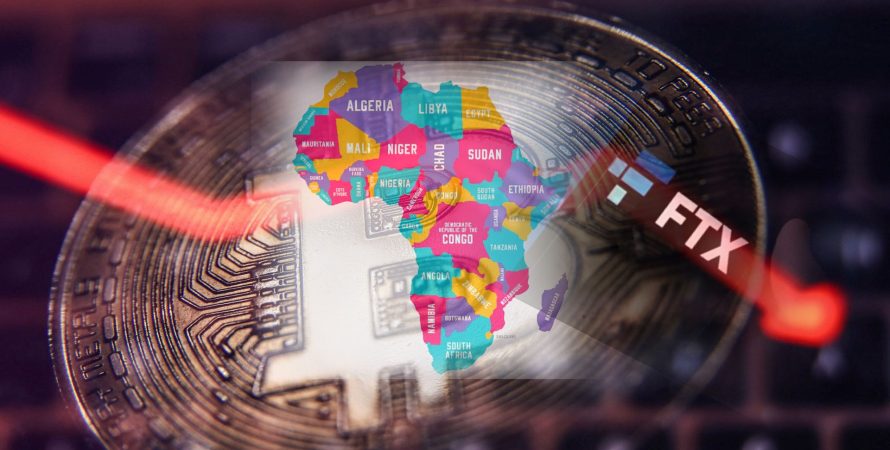Many crypto traders in Africa who used FTX-linked platforms are left in shock, unable to withdraw their funds and with nowhere to file their grievances.
Sam Bankman-Fried has quickly become a persona non grata everywhere, including in Africa. Once hailed as a crypto guru, the collapse of his FTX exchange platform has sent shockwaves round the world, taking with it billions of investors’ money. Even as he continues to thread tweets with apologetic overtones, Africans are taking stock of their own losses.
Crypto enthusiasts who traded different coins on FTX-linked platforms have been unable to withdraw their investments while crypto startups are facing their own losses. Nigerian web3 startup Nestcoin led by former Binance Labs director Yele Bademosi admitted to being affected by FTX’s downfall and has had to lay off employees. “Last week’s events have had an impact on us, as we held our assets (cash and stablecoins) at FTX. As a company we have to adjust our plans, rethink our strategy…Unfortunately, this means saying goodbye to some of our very talented Nesters,” Bademosi said.
Many crypto traders and experts who in the past spoke openly and enthusiastically to Quartz about the highly unregulated industry have remained silent when asked about the current crypto uncertainty, signaling the degree to which the crumbling of one of the world’s biggest crypto exchanges hit them.
FTX crypto losses are huge
Lucky Uwakwe, one of the pioneers of Africa’s blockchain revolution and CEO of Lagos-based tech firm SaBi Groups, tells Quartz the crypto losses from Bankman-Fried’s fraudulent schemes have been enormous. “Many crypto investors are broken-hearted and angry. Some just lost their entire fortunes. As the Naira keeps fluctuating, it is a double loss for Nigerians withdrawing their money from other crypto platforms. You get lower conversions against the dollar,” Uwakwe says.
Stay in the know on crypto by frequently visiting Crypto News Today
Six platforms, Uwakwe says, have been affected in Nigeria and more than 15 across the rest of the continent. Kenyans are also counting millions in losses. Other countries where the effects of FTX’s downfall are causing panic crypto withdrawals are South Africa, Egypt, Uganda, Tanzania, and Senegal.
Why Africa needs urgent regulation
And while some users in the Bahamas and the US were able to withdraw their funds before the full crisis hit, African traders may never access their money. “It is time Africa enacts laws that hold foreign companies accountable for their actions. If the African Union delays to push for these laws, then regional blocs such as the Economic Community of West African States (ECOWAS), East African Community (EAC), and Southern African Development Community (SADC) should lead the way in protecting Africans against future economic shocks from foregign players,” Uwakwe tells Quartz.

Many African central banks—Nigeria, Ghana, Kenya, South Africa, Tanzania, Uganda, Zambia, and Namibia—have been warning against the use and trade of crypto, but their citizens kept trusting the platforms in the hope of high returns. Only Ethiopia seems to be seriously regulating the space.
However, Nairobi-based author of Understanding the Blockchain and member of the Blockchain Association of Kenya Benjamin Arunda tells Quartz while FTX’s collapse has damaged the reputation of centralized exchanges, it may not affect crypto enthusiasm in Africa significantly.
“The crypto industry has become dynamic with multiple aspects such as NFTs and the metaverse appealing to young crypto audiences. FTX’s collapse will make them cautious on which exchange they trade in. But exchanges will have to set aside Proof of Reserves to cushion customers. Government regulators will have to speed up the development of regulatory frameworks to protect consumers,” he says. Several crypto platforms have been working hard to ensure they don’t end up like FTX.
The world’s biggest exchange, Binance, backed out of its Nov. 8 plans to acquire FTX and save it from financial distress citing reports of “mishandled customer funds and alleged US agency investigations” on Nov. 9. It collapsed two days later.
But its CEO Changpeng Zhao is not celebrating his competitors woes. He offers some advice.
African businesses that had started accepting crypto payments have halted the processes, as the industry keeps getting murky. Some startups were also trapped inside the crypto mix.
A longer crypto winter than expected
And while crypto lender BlockFi is preparing for potential bankruptcy following the FTX collapse, crypto adoption in Africa and the buoyancy that initially graced it is fast fading, and an even more prolonged global crypto winter is expected as bitcoin’s price keeps plunging and the extent of shadow banking by crypto exchanges keeps getting uncovered. “The crypto winter may be here for the next six months due to geopolitics, and the after-effects of covid lockdowns where big economies like the US utilized quantitative easing to stabilize the economy,” Arunda says.
After filing for bankruptcy on Nov. 11, Bankman-Fried is now looking for funds to cover $8 billion in withdrawal requests, but it will be a tough ask for investors who now feel cheated. And the fate of Africans’ crypto money remains unknown.![]()
Read More at QUARTZ
Please Read Essential Disclaimer Information Here.
© 2024 Crypto Caster provides information. CryptoCaster.world does not provide investment advice. Do your research before taking a market position on the purchase of cryptocurrency and other asset classes. Past performance of any asset is not indicative of future results. All rights reserved.
Contribute to CryptoCaster℠ Via Metamask or favorite wallet. Send Coin/Token to Addresses Provided Below.
Thank you!
BTC – bc1qgdnd752esyl4jv6nhz3ypuzwa6wav9wuzaeg9g
ETH – 0x7D8D76E60bFF59c5295Aa1b39D651f6735D6413D
MATIC – 0x7D8D76E60bFF59c5295Aa1b39D651f6735D6413D
LITECOIN – ltc1qxsgp5fykl0007hnwgl93zr9vngwd2jxwlddvqt





